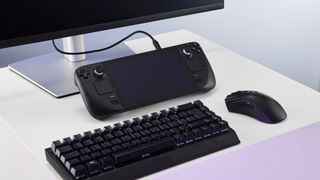Details on AMD's Ryzen 8000 APUs have leaked, with the eight core 8700G topping the list with 12 CUs
No official word on any of this yet, but CES is just around the corner.

Update: A press release from Gigabyte confirms Ryzen 8000-series APUs will launch in late January.
Original story: News of AMD's expected Zen 4 desktop APU range has been leaked onto the interwebs and it looks like there will be at least four new chips to choose from. The leader of the Ryzen 8000G series will have eight cores, 16 threads, and 12 RDNA 3 compute units to handle the graphics.
As reported by HKEPC, a motherboard manufacturer has leaked a raft of details about the long-awaited desktop version of AMD's Zen 4 Phoenix chips, which are currently used in laptops. Rather than using the current Ryzen 7000-series nomenclature, the report suggests that they'll use an 8000-series naming convention, instead.
The new series will start with the Ryzen 3 8300G, which will be a carbon copy of the new Ryzen 3 7440U. That means it will have four cores, one based on Zen 4, and the others will be the more compact Zen 4c design. That chip only has four compute units (CUs), so with just 256 shaders, it's not much of a gaming chip.
It actually looks like the entire Ryzen 8000G series is just going to comprise Ryzen 7040U chips, but using AM5 sockets for desktop PC motherboards. The most likely other change will be the power limit of the new APUs, as the 7040U line-up is capped at 30W. The Zen 3-based Ryzen 7 5700G, for example, has a TDP of 65W so we should expect the same for the new models.
Given that the Ryzen 7 7840U is used in handheld gaming PCs such as the OneXFly and the A1 Pro, we can make some good guesses as to how well the 8000G chips might perform in games. The Ayaneo Kun provides some guidance in this area as it can run up to 54W and compared to the chip's standard 30W mode. The extra power provides anywhere between 8% and 24% more fps, depending on the game.
The entry-level models probably won't be worth considering, unless they're priced very competitively, but a 65W Ryzen 7 8700G with eight cores, 12 threads, and 12 CUs (768 shaders) would make for a tasty 1080p all-in-one gaming chip.
The biggest gaming news, reviews and hardware deals
Keep up to date with the most important stories and the best deals, as picked by the PC Gamer team.

Steam Deck review: Our verdict on Valve's handheld.
Best Steam Deck accessories: Get decked out.
Steam Deck battery life: What's the real battery life?
Best handheld gaming PC: What the best travel buddy?
But one thing that's worth paying attention to is the amount of L3 cache in the Phoenix chips. Unlike the standard Ryzen desktop CPUs, which mostly sport 32MB, the top models in the 7040U lineup have 16MB of last level cache.
However, the gaming chops of the Ryzen 7 7800X3D (which has 96MB of L3 cache) shows that AMD's processors love having lots of cache and if the 8700G series has no more than 16MB, the CPU's gaming prowess won't be as potent as a standard eight core desktop Ryzen.
AMD hasn't said anything at all about a Zen 4 desktop APU, but with new motherboard BIOS updates confirming their existence, I can't imagine that an announcement is too far away in the future. CES 2024 is just a few months away from taking place and if I was a betting man, I'd slap a dollar or two down on AMD showcasing these new chips in the event.

Nick, gaming, and computers all first met in 1981, with the love affair starting on a Sinclair ZX81 in kit form and a book on ZX Basic. He ended up becoming a physics and IT teacher, but by the late 1990s decided it was time to cut his teeth writing for a long defunct UK tech site. He went on to do the same at Madonion, helping to write the help files for 3DMark and PCMark. After a short stint working at Beyond3D.com, Nick joined Futuremark (MadOnion rebranded) full-time, as editor-in-chief for its gaming and hardware section, YouGamers. After the site shutdown, he became an engineering and computing lecturer for many years, but missed the writing bug. Cue four years at TechSpot.com and over 100 long articles on anything and everything. He freely admits to being far too obsessed with GPUs and open world grindy RPGs, but who isn't these days?
Most Popular






